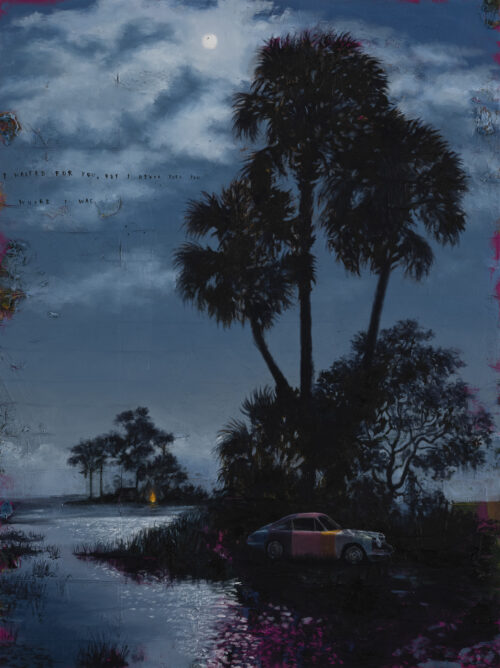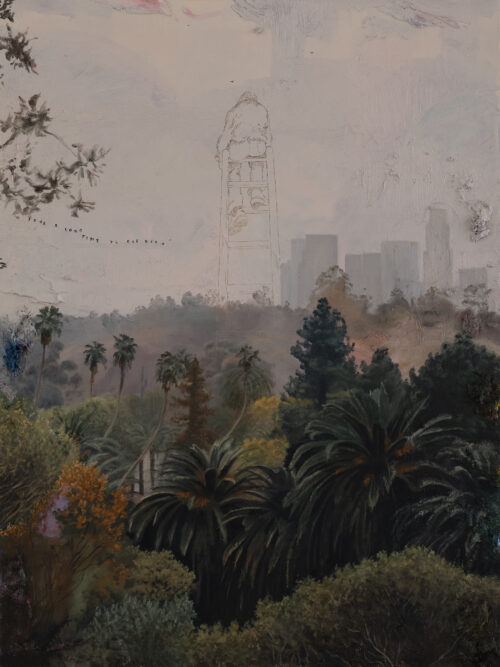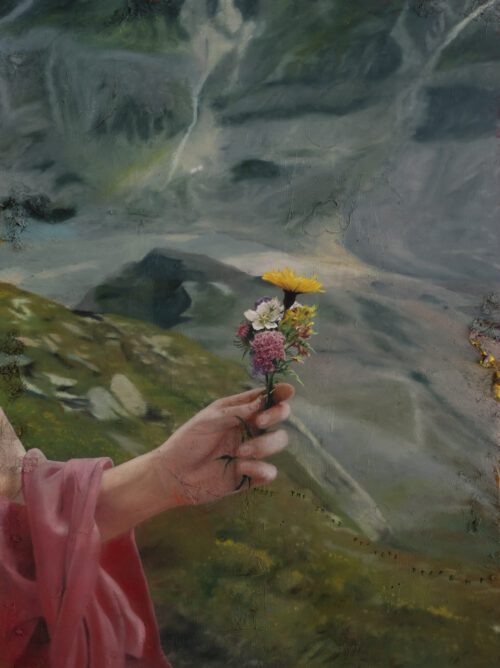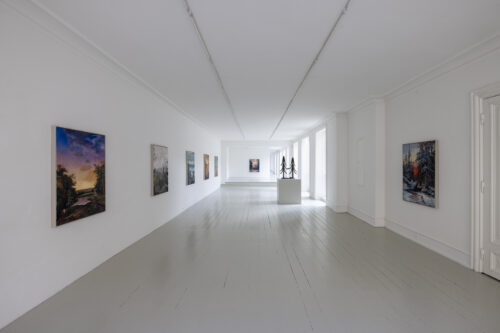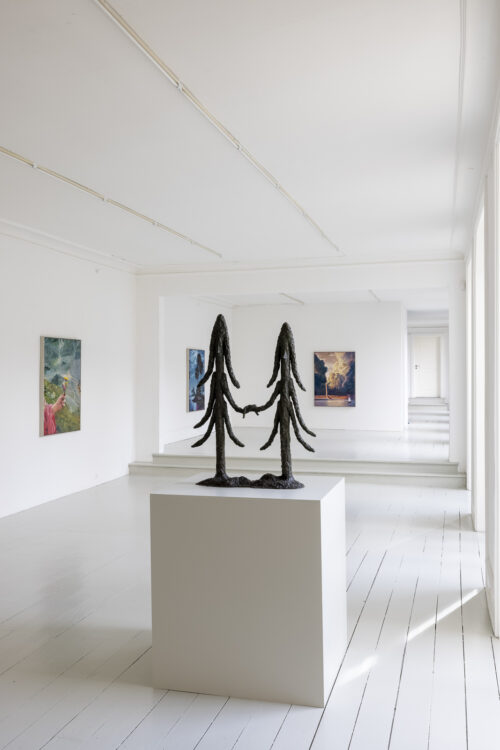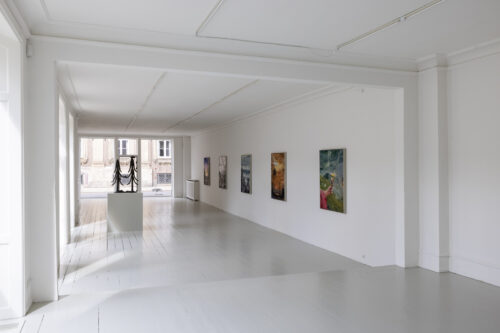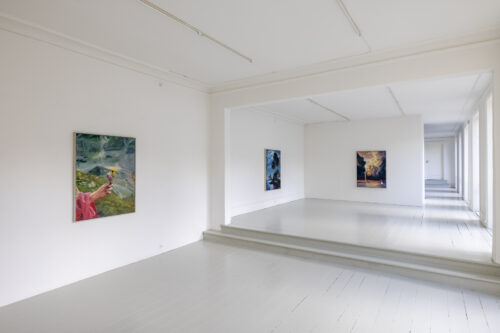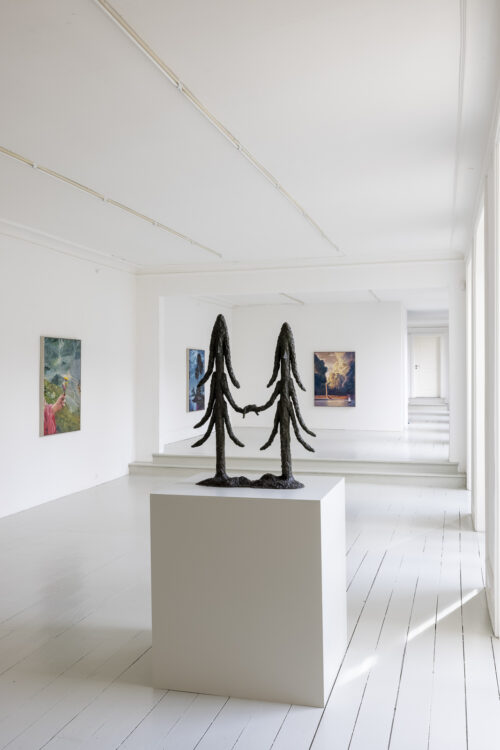LIFE IS SHORT AND DAYS ARE LONG
FRIEDRICH KUNATH
19 August / 9 October 2021
For his first solo exhibition at Avlskarl Gallery, L.A.-based artist Friedrich Kunath presents a new series of paintings inspired by a visit to Copenhagen. His cultural roots in German landscape painting, as well as western popular culture, creates colourful works of tragicomic landscapes dealing with universal themes such as love, hope, and loneliness.
A CONVERSATION WITH FRIEDRICH KUNATH
What were your thoughts creating Life is short and days are long in Avlskarl Gallery?
Sometimes I wish I would make work about a specific subject or concept that I could tie together in one sentence, but unfortunately, I choose these idiotic big themes of love, loss, melancholy, humour, tragic, and comedy, so here I am, talking about the big things.
The pieces are all oil paintings. It’s one of the most straightforward shows I have done. I think especially for this show, the room was essential, as it’s not your typical gallery. It is somewhat domestic, somewhat like a shop, and it’s beautiful. There wasn’t much that I could do in terms of crazy walls situations, where you remove a wall or add a wall. It’s such a classic, beautiful scenery, that I thought; it really just needs a good rhythm.
When you come in, you have this long wall and L-shape towards the end. I had a little model and I immediately felt like basically making one work. On the opposite wall, you got the windows. The works almost flows into the corner and seamlessly becomes one painting. The idea was 7-8 paintings which is very close to this narrative of ‘the week’. It almost becomes kind of diary-like entries. There is a landscape aspect as well, as they are all vertical. I was thinking a lot about the psychology of this room and what it needed. I always make the shows not only about the space, but also about where it is. When you make a show, most decisions are intuitive, but knowing Morten and visiting Denmark, I didn’t want to make a crazy show. I wanted to keep in tune with the city, with Morten, with what my feeling was, when I was there. That kind of sombre, but still hopeful mood. That kind of mood went into it intuitively and just built on its own. In the beginning, the more formal decisions guide you into the more intuitive decisions. I was thinking a lot about the colours, especially when I was walking around Copenhagen. Looking at the sky, looking at the architecture, looking at the scenery. Normally, I can go all airbrush-neon or tropical overkill any day, but I was in the mood for that sombre placement of what the city is. Sombre in the most positive way, in this kind of reflective state. I wanted to put these paintings in greys, Prussian blues – just like the northern sky. I wanted to let the colours and the feeling guide me through what eventually later became motives. Slowly, it built to this melancholy suite of paintings. If they were music, you would characterize them as ‘bedroom pop’. ‘Bedroom’ as in always having this inward intimacy, but obviously all the paintings depict somewhat of an outside. But in my case, the outside is the inside. The psychology of a landscape is always turning inwards.
“Life is short and days are long” seems to perfectly fit the current pandemic we’re in, has this isolating situation affected your process of work?
In a weird way, everything I made pre-pandemic always had this pandemic aspect to it, these themes of enthusiasm and then, complete isolation. The paradox of lonerism, that I call ‘alone with everybody’. There is a piece in the show that is called ‘I waited for you, but I never told you where I was’, which captures this paradox of wanting to be found, but wanting to be alone at the same time.
I’m pretty sure the title is from a Goethe book I had lying around, but I can’t find the book anymore. I think Goethe once said, ‘Life is short, and art is long’. Meaning that art is this prime eternity. Because I was thinking about days and the succession of days so much when doing the paintings, it dawned to me that this would be the perfect title. I like titles that not overly explain the show, but also have feel enough to carry it. I still don’t really know what it means, but I’m almost there – and that is exactly where I want to be. Really with everything; half-there. When you look at the sky at night, and you see stars side by side, you can only focus on one star when you look to the other star. When it’s a weak star, you can only look at it, if you don’t look directly at it. All my work is about that. The title is about; yes, it’s half-there, but it’s also half kept in the dark. The title has that kind of melancholy of long days, but also carries an eternity in ‘life is short’. It’s the themes that I’m always dealing with.
This feeling of in-between, is that a position that you take yourself when you work?
Yes, I always call it half-knowing what my job is. There is this moment when you try to dominate the work and that is where I stop. Because you don’t want to put too much into the work. You suck the air and the autonomy of the work itself into a vacuum, when you dominate it with your stupid, human ‘meaning’. The work is magical in itself – I just happen to be in the room and catch it, articulate it, and then it goes on. I am very aware how hard it is to articulate that, because it is so much about intuition, but at the same time, it is about precise intuition.
Masja Bentzen Wischmann
